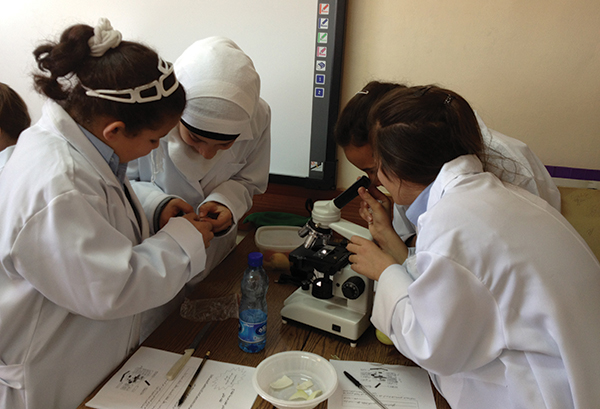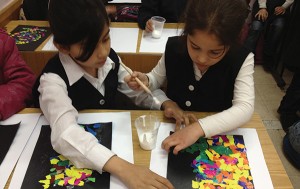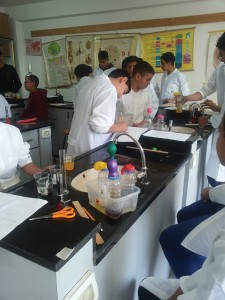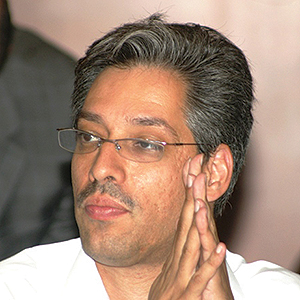
Is it possible for us to become a research-based society?
To answer this question, my memories take me back to the year 2003. In that year, we set a goal to develop schools in Jerusalem. Our dream was to help schools change from being mediocre to becoming excellent. We knew that most of the schools in Jerusalem were facing internal problems. They had a number of unskilled teachers, they lacked awareness of learning difficulties, they didn’t recognize that teachers should diversify teaching methods, act as facilitators in class, and adapt their teaching according to students’ learning styles. They ignored the significance of art and sport classes, and most important, they lacked educational visions. In addition, the schools’ infrastructure and facilities were inadequate. They also faced problems as a result of external factors. These factors included mainly the Israeli occupation measures of closing Jerusalem, which prevented teachers from reaching their schools. They also included the Israeli building-restriction policies that resulted in overcrowded schools.. Moreover, Israel had been working in every way to make life harder for Jerusalemites.
We were aware that these factors affected the normal growth and school achievement of the children in Jerusalem, but we did not realize the extent of illiteracy in the schools. In one instance, the illiteracy rate reached 40 percent at the eighth-grade level.i We had been unaware of the weaknesses in our curriculum. We hadn’t realized that several texts encourage gender inequality. Neither were we aware that some texts did not reflect any knowledge of the history of Palestinian society or its current social fabric.
The information that we had gathered made us decide to work comprehensively with the schools. Through our observations in the schools, we were able to recognize how the teaching/learning process was taking place in the classrooms, and we became aware of how deep the problem was. We discovered that there were very few teaching strategies in use that respected the children’s backgrounds, abilities, rights, and individual learning needs and talents. The education system was based on attaining knowledge through memorization and not on producing knowledge through research. Given that this system did not help students learn how to identify their problems, they were unable to search for solutions or take decisions that could change their future. It was clear to us that working on the infrastructure and the teaching tools without working on the thought system would be completely ineffective in enhancing the learning/teaching process.

We were determined that changing the thought system starts by changing the process of teaching and evaluation. Changing the teaching of reading was one of the elements that we worked on. We started training based on how we believe reading should be taught. Rather than teaching students simply to read, they must be taught how to decipher what they read; rather than teaching them how to memorize, they must be taught how to understand and critique what they read; rather than listening to each other read aloud in turn, they must be taught how to benefit from reading silently. Our observations showed that reading is not dealt with as an individual process, and teachers do not realize that instead of teaching reading during reading class, they are teaching listening.ii Given that testing reflects teaching, this teaching process can be changed if teachers change their evaluation methods. For example, in order not to teach students to memorize, teachers should not use a text for testing that they have used for teaching. Teachers can modify/doctor the texts they teach, making sure that the language they use is at the right level of their students, and then use these modified texts during testing. This will require students to read carefully and understand rather than simply memorize, and will require the teachers to teach differently.iii This process of modifying texts could also serve the teaching and evaluation of the rest of the language skills. Consequently, students are also gaining higher thinking skills that could enhance their research practices especially in the fields of literature and social sciences.
Research must also become an integral part of the learning process in natural science. Our observations revealed that this was not the case in practice. Even in a science lab, the best that was done was teaching students to practice an experiment. Students must not only be taught to do experiments but also to use their experiments to develop research work. Research starts when an experiment is repeated several times, changing one variable at a time and studying its effect.iv
Observations of math classes did not show different results. Math to some extent is also taught through memorization. Students are asked to memorize concepts rather than understand and analyze them and learn their applications in everyday practices. The understanding of math could be totally changed if teaching it was based on “patterns.”v If students learn math through patterns, they will better understand it, and they will also understand the base of research work. This cannot be done unless the teachers understand that math and the various sciences are based on patterns.
What we have experienced and learned year after year has multiplied our challenges and encouraged us to continue to develop our Comprehensive School Upgrading Program, which began in 2006. Today the program includes the establishment of a development team in every school that aims to develop an educational vision, school values, and strategic planning. It also includes training Arabic, English, math, and science teachers in lesson-planning and evaluation methods and techniques, as well as raising awareness among primary school teachers about learning difficulties. Raising awareness about children’s rights and developing teaching practices that are based on these rights is part of every training session. The diagnosis and treatment of students with learning difficulties is another major component of the program, as are extracurricular activities in both the arts and sports. The renovation of the school buildings and the establishment and development of libraries and science and computer labs are also an important part of the program. These components make up the basic activities that are used to develop the general school environment. They help teachers and students become aware of students’ rights, raise the level of achievement, and pave the way for accepting new styles of teaching. But they are not enough to establish a generation of students who are able to make their decisions based on research, analysis, and critical thinking. To reach this goal we had to develop scientific research practices inside the schools. We have therefore added new activities to our Comprehensive School Upgrading Program. Student activities include reading contests, science research clubs, and humanities research programs. Activities that target principals and teachers include “action research” practice and training on the teaching of research methods.

This is the tenth year that the foundation has been implementing the Comprehensive School Upgrading Program. The first six years allowed us to build a common language among the schools and to set a base of relevant activities. Seventeen schools have benefited from the four years of reading contests held by the foundation. Approximately 60 percent of the students from grades three to ten have participated in each contest by reading two books in Arabic and two in English. It’s also the fourth year that the foundation has been forming science research clubs in the natural sciences. Training of teachers is the main idea behind these science research clubs. Teachers in 12 schools have been trained to establish and run science research clubs at their schools. Moreover, this is the second year that a research program in the humanities has been implemented. The main aim is to train teachers to teach their students how to develop research in the humanities. During the first year, Arabic teachers from 3 schools were trained, and during this year, humanities’ teachers from 5 schools are being trained.
Our various programs have been accepted at all the schools we work with. Moreover, the schools have encouraged extracurricular activities, including reading and research programs. The various programs have indeed made schools friendlier in the eyes of the students. Our hopes rose when we reviewed our external evaluators’ report for 7 schools that we recently finished working with. The report showed that the students’ positive attitudes towards the relationship between the students and the school staff had gone up from 71.2 percent in 2012, the year we started, to 83.1 percent in 2014, the year we finished our work with them. It has also given us hope to know that there has been an increase in the level of satisfaction of children towards the respect of their rights, which has increased from 66 percent in 2012 to 84.2 percent in 2014.
Change is not impossible. Becoming a research-based society starts when schools encourage reading and research. Acceptance and will are there. It is the role of the social institutions and the government to support schools. Support must be provided in raising awareness and in training on how to turn the learning process into one that is research-based. It is not enough to encourage learning through projects or research; there is a dire need for trained teachers. Institutions support many aspects in the education process, but if there isn’t a vision for research-based learning, this support might make life at schools look better but will ultimately force us to remain the consumers we are today rather than the producers we should become.
» Abdalqader Husseini is the chairperson of the Faisal Husseini
Foundation (www.fhfpal.org).
i In 2005, during a needs assessment carried out at various schools in Jerusalem, the Faisal Husseini Foundation discovered that 40 percent of the eighth-grade students in one Jerusalem school were illiterate.
ii For more information, see Dr. Mousa Khoury, The Steps towards Reading, Faisal Husseini Foundation, Jerusalem, 2014. In this manual, Dr. Mousa Khoury defines reading as a process of reproducing the text. He describes the oral cultures and the reading act in the cultures that are in a phase between being oral and being literal. He then explains the reasons behind weak reading comprehension skills and how reading skills should be taught. He presents several models that can be used by teachers of different grades.
iii For more information on modifying texts, see Dr. Jeanne Kattan, Our Treasure Box, Faisal Husseini Foundation, Jerusalem, 2014. In this manual, Dr. Jeanne Kattan explains why and how to use doctored texts. She also presents model lessons developed by the trainee teachers for teaching the four language skills. In addition, she explains what project work is and its role in giving opportunities for students to develop their confidence and independence and to work together in a real-world environment. She also includes project model lessons developed by the trainee teachers.
iv For more information, see Dima Halawani, Discovering by Our Hands, Faisal Husseini Foundation, Jerusalem, 2014. In this manual Ms. Dima Halawani explains the process of conducting a science club at the schools. She focuses on how to train students to conduct scientific research. She has included examples of model science club sessions that were conducted during the program, and which can be useful to any science teacher interested in creating a science club at her/his school.
v For more information, see Kawthar Atiyeh Yaseen, Life is Patterns, Faisal Husseini Foundation, Jerusalem, 2014. Ms. Kawthar Yassin chose to give the manual this title not only to reflect the importance of patterns in math but also to reflect the idea of basing the teaching of math on the teaching of patterns. She includes a detailed explanation of the use of patterns in teaching and offers model lessons that cater to grades one to three.


